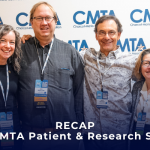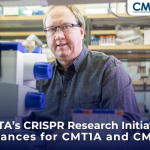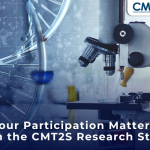- CMT2F Natural History Study Nears Full Recruitment as Biomarker Analysis Begins
 With CMTA support of $302,071, an international team of researchers from the Inherited Neuropathies Consortium, led by Micheal Shy, MD, at the University of Iowa in Iowa City, IA, is studying the natural history of CMT2F to learn how this ...Read more ...
With CMTA support of $302,071, an international team of researchers from the Inherited Neuropathies Consortium, led by Micheal Shy, MD, at the University of Iowa in Iowa City, IA, is studying the natural history of CMT2F to learn how this ...Read more ... - Recap: 2024 CMTA Patient & Research Summit
 Help for Today and Hope for Tomorrow: Empowering the CMT Community at the 2024 CMTA Patient & Research Summit in Denver The 2024 CMTA Patient & Research Summit in Colorado was a remarkable gathering of more than 450 attendees—both in person ...Read more ...
Help for Today and Hope for Tomorrow: Empowering the CMT Community at the 2024 CMTA Patient & Research Summit in Denver The 2024 CMTA Patient & Research Summit in Colorado was a remarkable gathering of more than 450 attendees—both in person ...Read more ... - CMTA’s CRISPR Research Initiative Advances for CMT1A and CMT1B
 The Charcot-Marie-Tooth Association (CMTA) continues its mission to accelerate research that impacts the lives of those living with Charcot-Marie-Tooth disease (CMT) and is excited to share progress in a CRISPR research project focused on developing gene editing strategies for CMT1A ...Read more ...
The Charcot-Marie-Tooth Association (CMTA) continues its mission to accelerate research that impacts the lives of those living with Charcot-Marie-Tooth disease (CMT) and is excited to share progress in a CRISPR research project focused on developing gene editing strategies for CMT1A ...Read more ... - Your Participation Matters: Join the CMT2S Research Study
 CMT2S: A Potential New Treatment on the Horizon Charcot-Marie-Tooth Disease Type 2S (CMT2S) is a severe axonal type of CMT caused by certain autosomal recessive mutations of the IGHMBP2 gene. CMTA-STAR Alliance Partner Vanda Pharmaceuticals recently received USFDA approval for ...Read more ...
CMT2S: A Potential New Treatment on the Horizon Charcot-Marie-Tooth Disease Type 2S (CMT2S) is a severe axonal type of CMT caused by certain autosomal recessive mutations of the IGHMBP2 gene. CMTA-STAR Alliance Partner Vanda Pharmaceuticals recently received USFDA approval for ...Read more ... - CMTA’s Strategic Investment Advances Research for CMT1A and CMT1B
 The Charcot-Marie-Tooth Association (CMTA) continues its mission to accelerate research that impacts the lives of those living with Charcot-Marie-Tooth disease (CMT). Building on previous successes, CMTA announced earlier this year a strategic $450,000 investment in a new research project to ...Read more ...
The Charcot-Marie-Tooth Association (CMTA) continues its mission to accelerate research that impacts the lives of those living with Charcot-Marie-Tooth disease (CMT). Building on previous successes, CMTA announced earlier this year a strategic $450,000 investment in a new research project to ...Read more ...

Charcot–Marie–Tooth Association
Accelerating Research Empowering Patients









